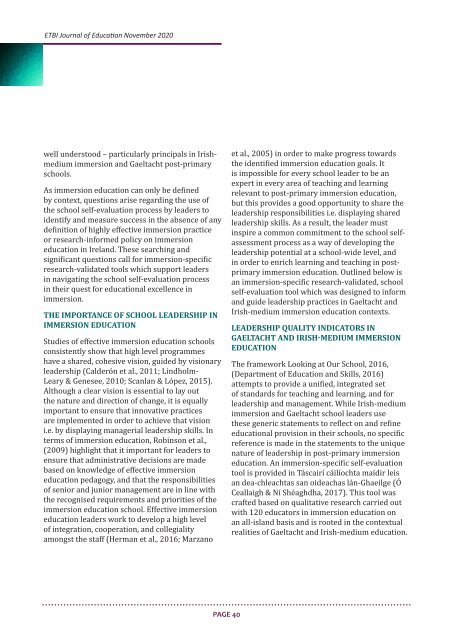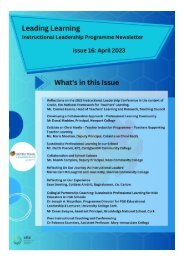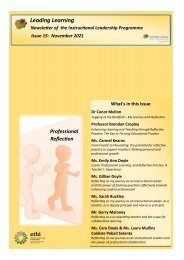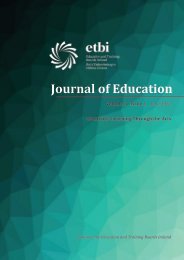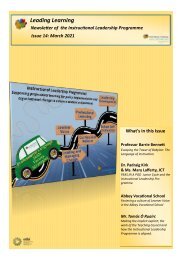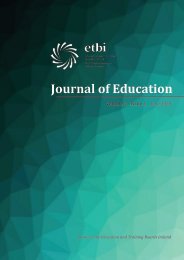ETBI Journal of Education - Vol 2:2 November 2020 (Irish-medium Education)
This bilingual edition of the Journal of Education celebrates Irish-medium Education
This bilingual edition of the Journal of Education celebrates Irish-medium Education
Create successful ePaper yourself
Turn your PDF publications into a flip-book with our unique Google optimized e-Paper software.
<strong>ETBI</strong> <strong>Journal</strong> <strong>of</strong> <strong>Education</strong> <strong>November</strong> <strong>2020</strong><br />
well understood – particularly principals in <strong>Irish</strong><strong>medium</strong><br />
immersion and Gaeltacht post-primary<br />
schools.<br />
As immersion education can only be defined<br />
by context, questions arise regarding the use <strong>of</strong><br />
the school self-evaluation process by leaders to<br />
identify and measure success in the absence <strong>of</strong> any<br />
definition <strong>of</strong> highly effective immersion practice<br />
or research-informed policy on immersion<br />
education in Ireland. These searching and<br />
significant questions call for immersion-specific<br />
research-validated tools which support leaders<br />
in navigating the school self-evaluation process<br />
in their quest for educational excellence in<br />
immersion.<br />
THE IMPORTANCE OF SCHOOL LEADERSHIP IN<br />
IMMERSION EDUCATION<br />
Studies <strong>of</strong> effective immersion education schools<br />
consistently show that high level programmes<br />
have a shared, cohesive vision, guided by visionary<br />
leadership (Calderón et al., 2011; Lindholm-<br />
Leary & Genesee, 2010; Scanlan & López, 2015).<br />
Although a clear vision is essential to lay out<br />
the nature and direction <strong>of</strong> change, it is equally<br />
important to ensure that innovative practices<br />
are implemented in order to achieve that vision<br />
i.e. by displaying managerial leadership skills. In<br />
terms <strong>of</strong> immersion education, Robinson et al.,<br />
(2009) highlight that it important for leaders to<br />
ensure that administrative decisions are made<br />
based on knowledge <strong>of</strong> effective immersion<br />
education pedagogy, and that the responsibilities<br />
<strong>of</strong> senior and junior management are in line with<br />
the recognised requirements and priorities <strong>of</strong> the<br />
immersion education school. Effective immersion<br />
education leaders work to develop a high level<br />
<strong>of</strong> integration, cooperation, and collegiality<br />
amongst the staff (Herman et al., 2016; Marzano<br />
et al., 2005) in order to make progress towards<br />
the identified immersion education goals. It<br />
is impossible for every school leader to be an<br />
expert in every area <strong>of</strong> teaching and learning<br />
relevant to post-primary immersion education,<br />
but this provides a good opportunity to share the<br />
leadership responsibilities i.e. displaying shared<br />
leadership skills. As a result, the leader must<br />
inspire a common commitment to the school selfassessment<br />
process as a way <strong>of</strong> developing the<br />
leadership potential at a school-wide level, and<br />
in order to enrich learning and teaching in postprimary<br />
immersion education. Outlined below is<br />
an immersion-specific research-validated, school<br />
self-evaluation tool which was designed to inform<br />
and guide leadership practices in Gaeltacht and<br />
<strong>Irish</strong>-<strong>medium</strong> immersion education contexts.<br />
LEADERSHIP QUALITY INDICATORS IN<br />
GAELTACHT AND IRISH-MEDIUM IMMERSION<br />
EDUCATION<br />
The framework Looking at Our School, 2016,<br />
(Department <strong>of</strong> <strong>Education</strong> and Skills, 2016)<br />
attempts to provide a unified, integrated set<br />
<strong>of</strong> standards for teaching and learning, and for<br />
leadership and management. While <strong>Irish</strong>-<strong>medium</strong><br />
immersion and Gaeltacht school leaders use<br />
these generic statements to reflect on and refine<br />
educational provision in their schools, no specific<br />
reference is made in the statements to the unique<br />
nature <strong>of</strong> leadership in post-primary immersion<br />
education. An immersion-specific self-evaluation<br />
tool is provided in Táscairí cáilíochta maidir leis<br />
an dea-chleachtas san oideachas lán-Ghaeilge (Ó<br />
Ceallaigh & Ní Shéaghdha, 2017). This tool was<br />
crafted based on qualitative research carried out<br />
with 120 educators in immersion education on<br />
an all-island basis and is rooted in the contextual<br />
realities <strong>of</strong> Gaeltacht and <strong>Irish</strong>-<strong>medium</strong> education.<br />
PAGE 40


